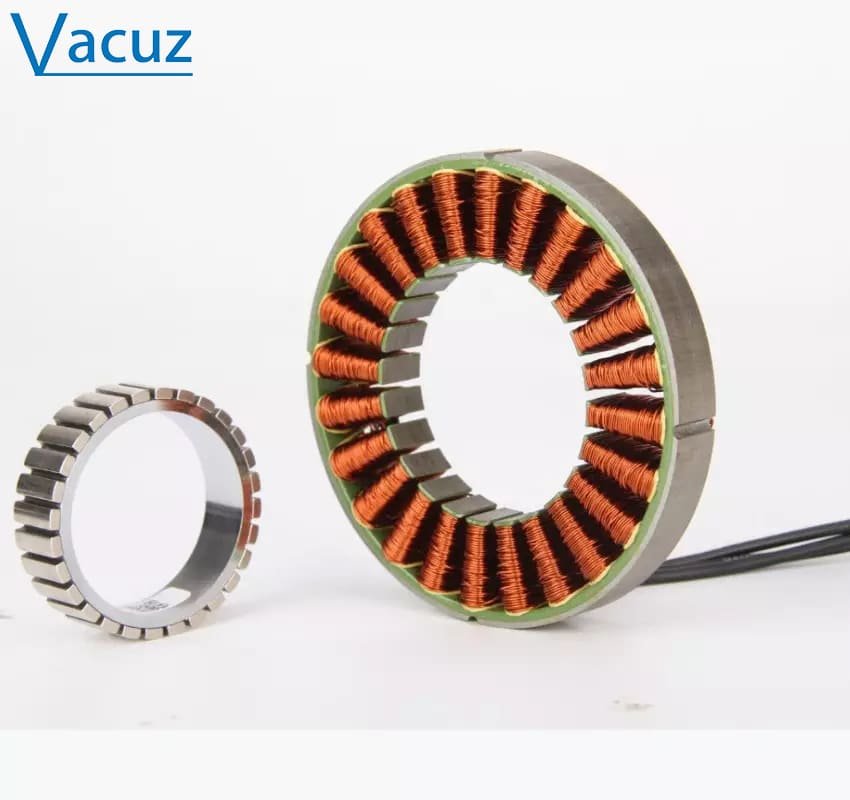In the design field of brushless motor winding machines, modular design is undoubtedly an important innovation direction. It forms a series of basic unit modules by functionally and structurally decomposing the main body, control system and external configuration components of the winding machine. These modules not only have the same or similar functions, but are also equipped with unified interfaces and installation methods, so that they can be flexibly combined to meet the needs of different customers. The following is Vacuz’s in-depth analysis and restatement of the modular design and model change requirements of brushless motor winding machines:

BLDC 24V 1500W motor po meri brez ščetk Stator
1. Modular design concept of brushless motor winding machines
Interpretation of modular principles:
Modular design is a method of decomposing a complex system into multiple simple modules. This principle is widely used in the design of brushless motor winding machines. Designers divide the various parts of the winding machine according to function and structure to form multiple basic unit modules. These modules are both independent and interrelated, and together constitute a complete winding machine system.
Advantages of modular design:
1. Flexibility and adaptability: Modular design enables the winding machine to be quickly configured and adjusted according to the needs of different customers. By replacing or adjusting different modules, customized production of equipment can be easily achieved.
2. Simplification of production and maintenance: Modular design simplifies the production and maintenance process of equipment. Since each module has a unified interface and installation method, production and maintenance become more efficient and convenient.
3. Convenience of upgrade and transformation: Modular design also facilitates the upgrade and transformation of equipment. With the continuous advancement of technology and changes in customer needs, designers can easily update or replace certain modules to maintain the advancement and competitiveness of equipment.
II. Requirements and practice of brushless motor winding machine type change
When performing the type change operation of the brushless motor winding machine, a series of requirements must be strictly followed to ensure the quality and efficiency of the winding after the type change. These requirements include shutdown and power off, disassembly of old tooling, cleaning of the winding machine, installation of new tooling, and testing and adjustment.
Detailed interpretation of type change requirements:
1. Shutdown and power off: Before any type change operation, it is necessary to ensure that the winding machine has been completely shut down and the power supply has been cut off. This is to prevent accidents and ensure the safety of operators.
2. Remove the old tooling: When removing the old tooling, you need to operate carefully to avoid damaging the tooling or the winding machine. At the same time, the removed tooling needs to be properly stored and handled.
3. Clean the winding machine: Thoroughly cleaning the winding machine is an important part of the changeover process. By removing dust and foreign matter, a clean and tidy environment can be provided for the installation of the new tooling.
4. Install the new tooling: According to the specifications and requirements of the new stator, select the appropriate tooling for installation. During the installation process, it is necessary to handle it with care and ensure that the tooling and the winding machine are accurately aligned and firmly fixed.
5. Test and adjust: Starting the winding machine for testing and adjusting the relevant parameters and positions according to the test results is the last step in the changeover process. Through testing and adjustment, it can be ensured that the winding effect meets the predetermined requirements, including accurate control of parameters such as winding speed, tension, number of turns, and inspection of the neatness and precision of the wiring arrangement.
Key points of practice for model change requirements:
1. Matchability: The tooling model must be strictly matched with the winding machine to ensure the normal operation of the equipment and the winding quality. When selecting tooling, its applicability and compatibility need to be fully considered.
2. Accuracy: The positioning of the tooling and the winding machine should be accurate to avoid errors during the winding process. This requires operators to have high professional skills and a rigorous work attitude when installing and adjusting.
3. Flexibility: The winding machine should have high flexibility to adapt to the stator winding requirements of different specifications and models. Through modular design, flexible configuration and adjustment of equipment can be easily achieved.
4. Safety: The model change process should strictly comply with safety regulations to ensure the safety of operators. This includes wearing necessary protective equipment, following correct operating procedures, and handling abnormal situations in a timely manner.
5. Maintainability: The winding machine should be easy to maintain and maintain to ensure the long-term stable operation of the equipment. This requires designers to fully consider the maintainability and ease of maintenance of the equipment during the design process.

Brezkrtačni motor BLDC Statorska tuljava
In summary, the modular design and conversion requirements of brushless motor winding machines are the key to achieving equipment flexibility and adaptability. Through modular design, the equipment can be quickly configured and adjusted according to customer needs; and strict conversion requirements ensure the winding quality and efficiency after the conversion. These innovative design concepts and practical methods will help improve the market competitiveness of brushless motor winding machines and meet the ever-changing customer needs.
E-naslov: sales@vacuz.com





